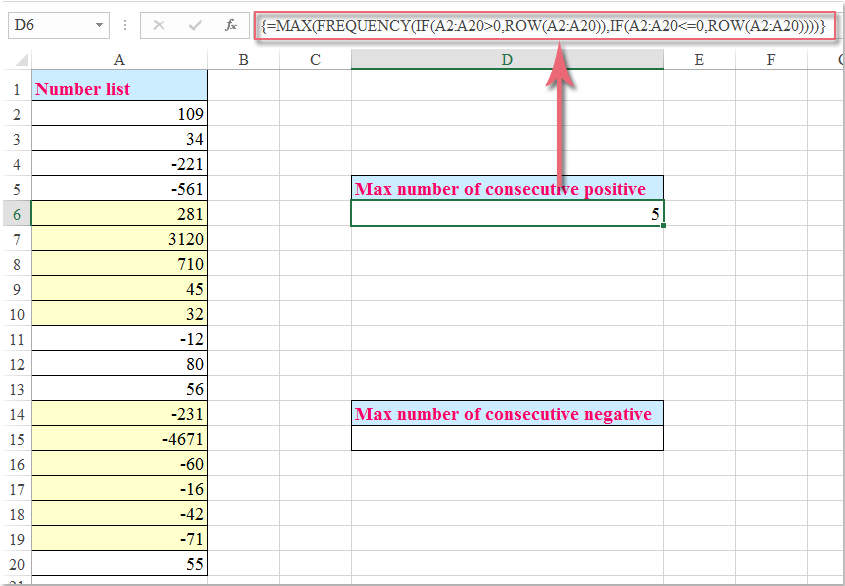How to count max number of consecutive positive / negative numbers in Excel?
If you have a list of data which mix with positive and negative numbers, and now, you want to count the max number of consecutive positive and negative numbers as following screenshot shown, how could you deal with this task in Excel?

Count the max number of consecutive positive and negative numbers with array formulas
Count the max number of consecutive positive and negative numbers with array formulas
To get the max number of consecutive positive and negative numbers, please apply the following array formulas:
Count the max number of consecutive positive numbers:
Enter this formula into a cell where you want to get the result:
=MAX(FREQUENCY(IF(A2:A20>0,ROW(A2:A20)),IF(A2:A20<=0,ROW(A2:A20)))), and then press Ctrl + Shift + Enter keys together, and you will get the correct result as you need, see screenshot:

Count the max number of consecutive negative numbers:
Enter this formula into a cell where you want to get the result:
=MAX(FREQUENCY(IF(A2:A20<0,ROW(A2:A20)),IF(A2:A20>=0,ROW(A2:A20)))), and then press Ctrl + Shift + Enter keys simultaneously, and you will get the result as you need, see screenshot:

Note: In the above formulas, A2:A20 is the list of cell range which you want to use.

Unlock Excel Magic with Kutools AI
- Smart Execution: Perform cell operations, analyze data, and create charts—all driven by simple commands.
- Custom Formulas: Generate tailored formulas to streamline your workflows.
- VBA Coding: Write and implement VBA code effortlessly.
- Formula Interpretation: Understand complex formulas with ease.
- Text Translation: Break language barriers within your spreadsheets.
Best Office Productivity Tools
Supercharge Your Excel Skills with Kutools for Excel, and Experience Efficiency Like Never Before. Kutools for Excel Offers Over 300 Advanced Features to Boost Productivity and Save Time. Click Here to Get The Feature You Need The Most...
Office Tab Brings Tabbed interface to Office, and Make Your Work Much Easier
- Enable tabbed editing and reading in Word, Excel, PowerPoint, Publisher, Access, Visio and Project.
- Open and create multiple documents in new tabs of the same window, rather than in new windows.
- Increases your productivity by 50%, and reduces hundreds of mouse clicks for you every day!
All Kutools add-ins. One installer
Kutools for Office suite bundles add-ins for Excel, Word, Outlook & PowerPoint plus Office Tab Pro, which is ideal for teams working across Office apps.
- All-in-one suite — Excel, Word, Outlook & PowerPoint add-ins + Office Tab Pro
- One installer, one license — set up in minutes (MSI-ready)
- Works better together — streamlined productivity across Office apps
- 30-day full-featured trial — no registration, no credit card
- Best value — save vs buying individual add-in